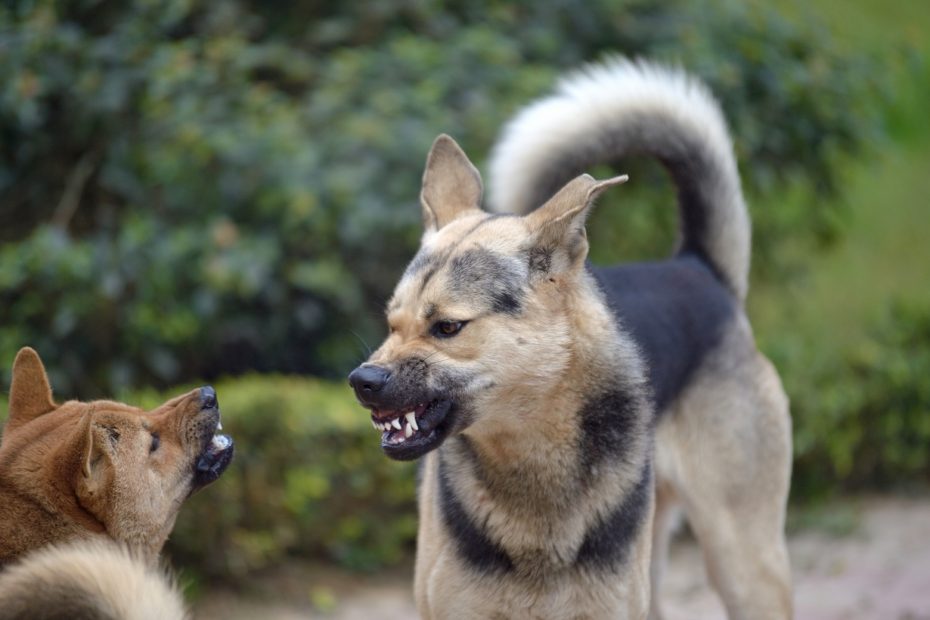Will neutering a dog stop aggression? If you have a dog that demonstrates aggressive behavior, it’s probably a question you’ve asked yourself more than once.
Unfortunately, there isn’t a straightforward answer.
I mean, yes, neutering a dog can calm their aggressive tendencies to some degree, but it’s not a cure-all. And if their behavior is being caused by raging testosterone, then neutering can certainly make a difference.
However, if their behavior is being caused by something else, its effects are going to be minimal.
But let’s step back and take a look at the bigger picture. Before addressing the question of whether neutering really can stop your dog’s unwanted aggression, there’s another question to answer… namely, what exactly does the neutering process involve?
Just to give you a little insight, the neutering of male dogs refers to the surgical removal of their testicles to reduce the risks of testicular cancer and other prostate diseases.
The process involves general anesthesia to ensure sterilization and removal of the male hormones.
Some dog owners fear that neutering will change their dog’s personality or lead to depression or low self-esteem.
While others believe that it will prevent certain behaviors like sex drive, dominance, and yes, even aggression.
But is that enough to support the claim that neutering is the best course of action?
In a word, no.
Dogs are more than just raging testosterone.
So with this in mind (and before you go diving in headfirst with a scalpel), I’d highly recommend taking a few minutes to check out the short video below from Dan Abdelnoor over at The Online Dog Trainer.
During the video, Dan discusses why most dog training methods ultimately set you up to fail before revealing the missing piece of the puzzle to calming the aggressive tendencies in your dog.
Better still, Dan’s training techniques take just minutes a day to put your dog in a calm, relaxed, highly responsive state.
So watch the video, apply the training, and you should see a huge improvement in your dog’s ability to remain calm without the need for castration.
Here’s the link to the video take a look: Click Here To Discover How To Finally Stop Your Dogs Unwanted Aggression Using A Simple, Highly Effective Training Technique That Takes Minutes A Day To Implement!
(video will open in a new window)
Will Neutering A Dog Stop Aggression? – Types Of Aggression
Having an aggressive dog can be terrifying and scary. If you have a dog pet that you love, and they suddenly become aggressive, you may feel disappointed and terrified.
Dog aggression is usually displayed through a variety of behaviors such as barking, lunging, snapping, snarling, growling, and even biting.
Some dogs may also start barking at other dogs when they become aggressive.
It is not normal when your cheerful, loving dog suddenly becomes aggressive for no reason. Hence, you might want to know what could be the causes of dog aggression.
Here are some of the major reasons why your dog is aggressive:
Fear Aggression
Fear is the most common reason why dogs develop aggressive behavior, especially towards other dogs.
If a dog is fearful, they can easily exhibit aggressive behavior towards people and other dogs.
When involved in danger, and they cannot escape, most dogs feel the need to defend themselves by being aggressive.
They may start barking violently to scare away whatever is threatening them. For example;
If they are trapped in a corner and there is no way out, or they see you lifting your hand like you want to hit them, they may get fearful. Hence, they start barking or growling aggressively.
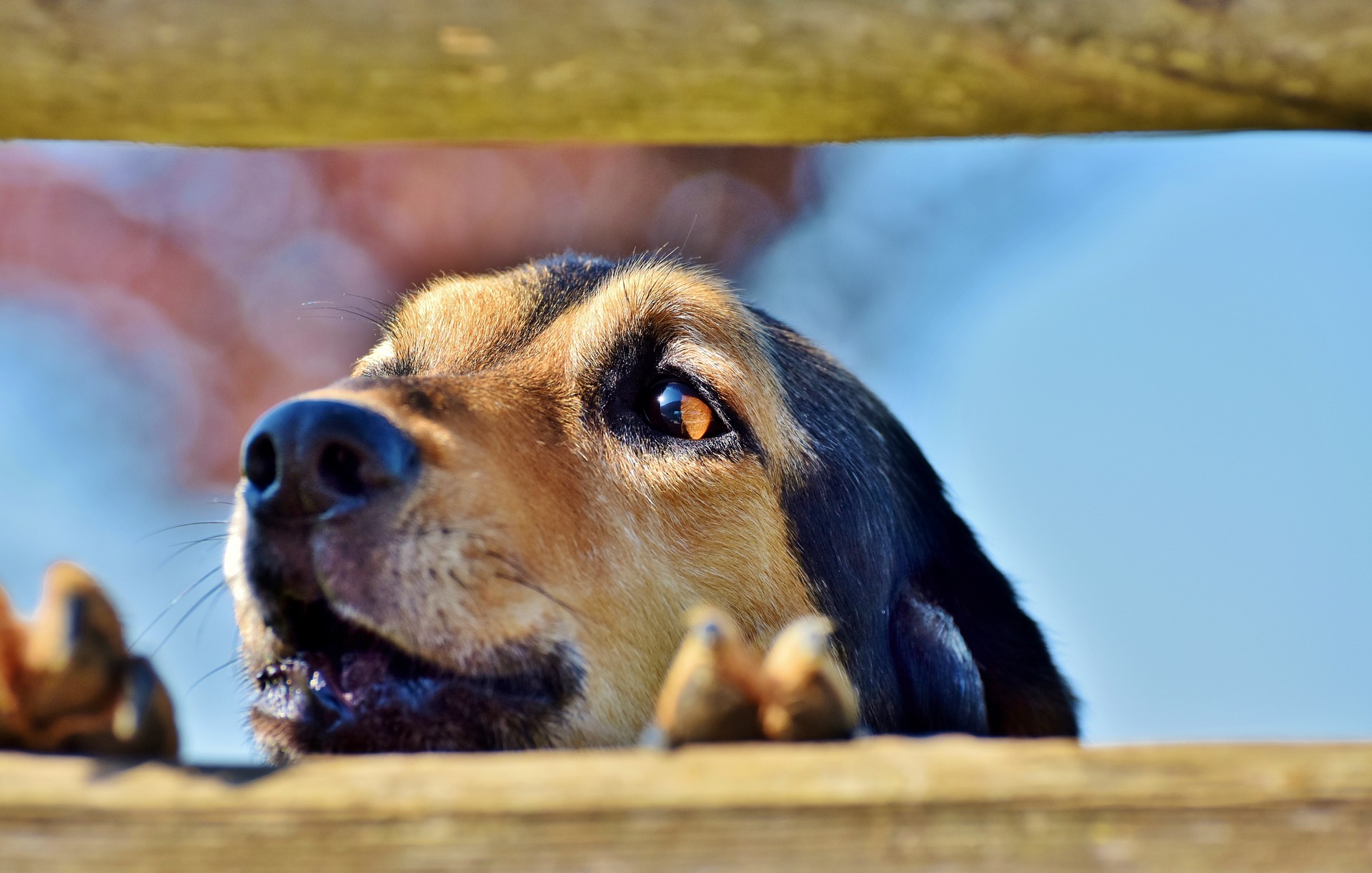

Anxiety-Related Aggression
Just like human beings, dogs get anxious. Most dogs experience anxiety when they are in a new environment or when they are around a new person.
While different dogs react differently, research has revealed that anxiety can affect all dog breeds regardless of their bravery.
Your dog can also be anxious after they are separated from their family members.
Anxiety makes the dog feel unpleasant, and most of them end up developing aggressive behavior.
An anxious dog can also start to destroy things in the compound, and it isn’t easy to calm them down.
Frustration
Frustration in dogs can occur when dogs are fighting, and someone tries to stop the fight.
The dog becomes very frustrated, and they can bite the person trying to interfere. This frustration is often referred to as redirected aggression.
It can also happen when a person or an animal restricts them from displaying their aggression towards another dog or a person.
A dog can also get frustrated when they are not able to get something because a person or an animal is interfering.
In this case, both male and female dogs are affected by redirected aggression, regardless of whether they are puppies or adults.
Aggression Due To Illness
Many health problems in dogs can affect your dog’s personality and lead to aggression.
If you notice that your dog’s aggression comes with other symptoms like weight gain, hair loss, or weariness, they may be suffering from hypothyroidism.
If there are other symptoms like shakings and mood changes, your dog may have seizures.
Other health issues that could lead to aggression include brain damage, thyroid issues, trauma, and age-related diseases.
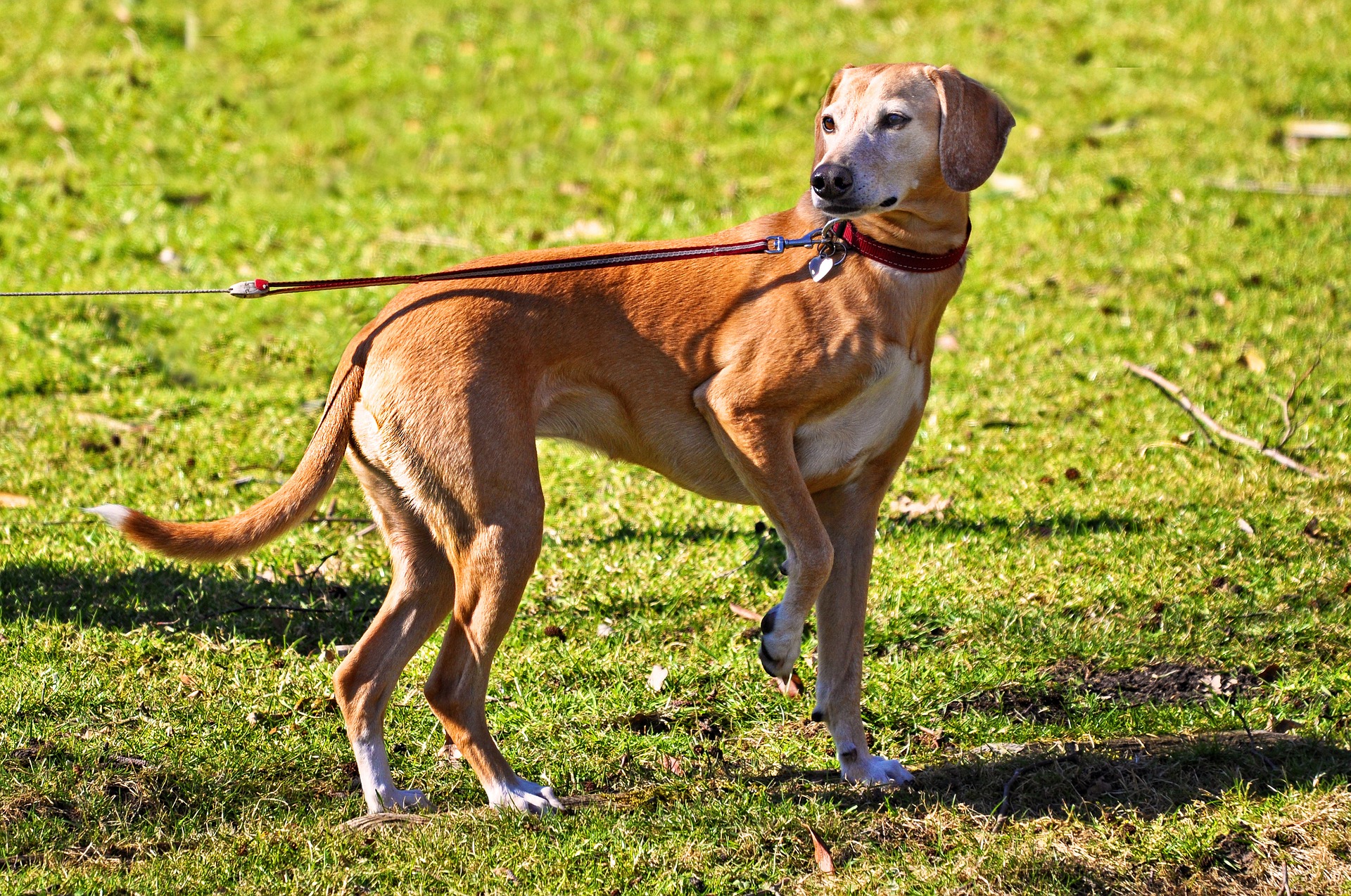

Leash Aggression
Leash aggression usually happens when a dog feels restrained, uncomfortable, and frustrated in a social situation and is attached to a leash.
The dog becomes aggressive because they feel that they cannot do anything about the fear source, since they can’t run.
If you walk around with your leashed dog, and you realize that they are aggressive, the leash could be the source of their aggression.
Social Aggression
When dogs live in groups, there are specific rules they have to put in place to prevent conflicts.
Such rules include who gets food, resting sports, or even opportunities to mate first. These rules are usually reinforced through aggression by the stronger dogs.
Stronger dogs become aggressive towards the weaker ones, reminding them of their status. This kind of aggression is also known as status-seeking aggression.
Social aggression is more common in male dogs than in females, especially if they are purebreds. It develops when a dog is one to three years old.
Resource Guarding
When a dog loves and cherishes a toy or a person, they may become aggressively possessive and exhibit resource guarding.
Some dogs may also display aggression towards other dogs or a person who tries to come near their food bowl or approach them while they eat.
Other dogs may display resource guarding when protecting their resting spots and other things they have stolen.
Sex-Related Aggression
While male dogs often try to seek for female attention, female dogs also compete to access the male.
Intact males can sometimes fight with other male dogs over a female dog.
If you have both male and female dogs, you may realize that the weak males become aggressive because the strong ones won’t allow them to attract females.
Nonetheless, male dogs can still fight against each other, even when there is no female dog present.
Sex-related aggression usually happens to dogs of at least one to three years.
If you have an aggressive dog, you might want to take them for neutering to thwart the aggression.
WATCH VIDEO: Discover How To Finally Solve Your Dogs Unwanted Aggression Problem In Just Minutes A Day… Without The Need For Expensive, Unnecessary Surgery!
(video will open in a new window)
How Does Neutering Help With Aggression In Male Dogs?
When you neuter your dog, the only behaviors that will be affected are those under the influence of male hormones, including aggressiveness and undesirable sexual behavior.
Neutering will not interfere with your dog’s personality and ability to work.
Moreover, castration will not calm a cheerful and excitable dog.
Neutering will curb undesirable sexual behavior like roaming, masturbation, mounting, and a strong attraction to females. It will also reduce urine marking in about 40%.
Before you decide to neuter your dog, it is crucial to understand and weigh the pros and cons of dog neutering. Here are the main pros and cons:
Pros Of Neutering
Reduced Risk of Prostate Cancer
Testicular cancer is prevalent among dogs. Neutering your dog keeps it off from risk of suffering from this type of cancer. Besides, neutered dogs rarely experience conditions like cysts or infections.
80% of all unneutered dogs will experience enlarged prostates while at the age of 5 years. Enlarged prostates cause difficulty in urinating.
Reduced Mating Urge
Unneutered dogs have a strong urge to mate and will usually run away from home whenever they sense a female dog that requires mating in the neighborhood.
Neutering reduces this urge, and your dog will be going outside to explore and not because of the mating urge.
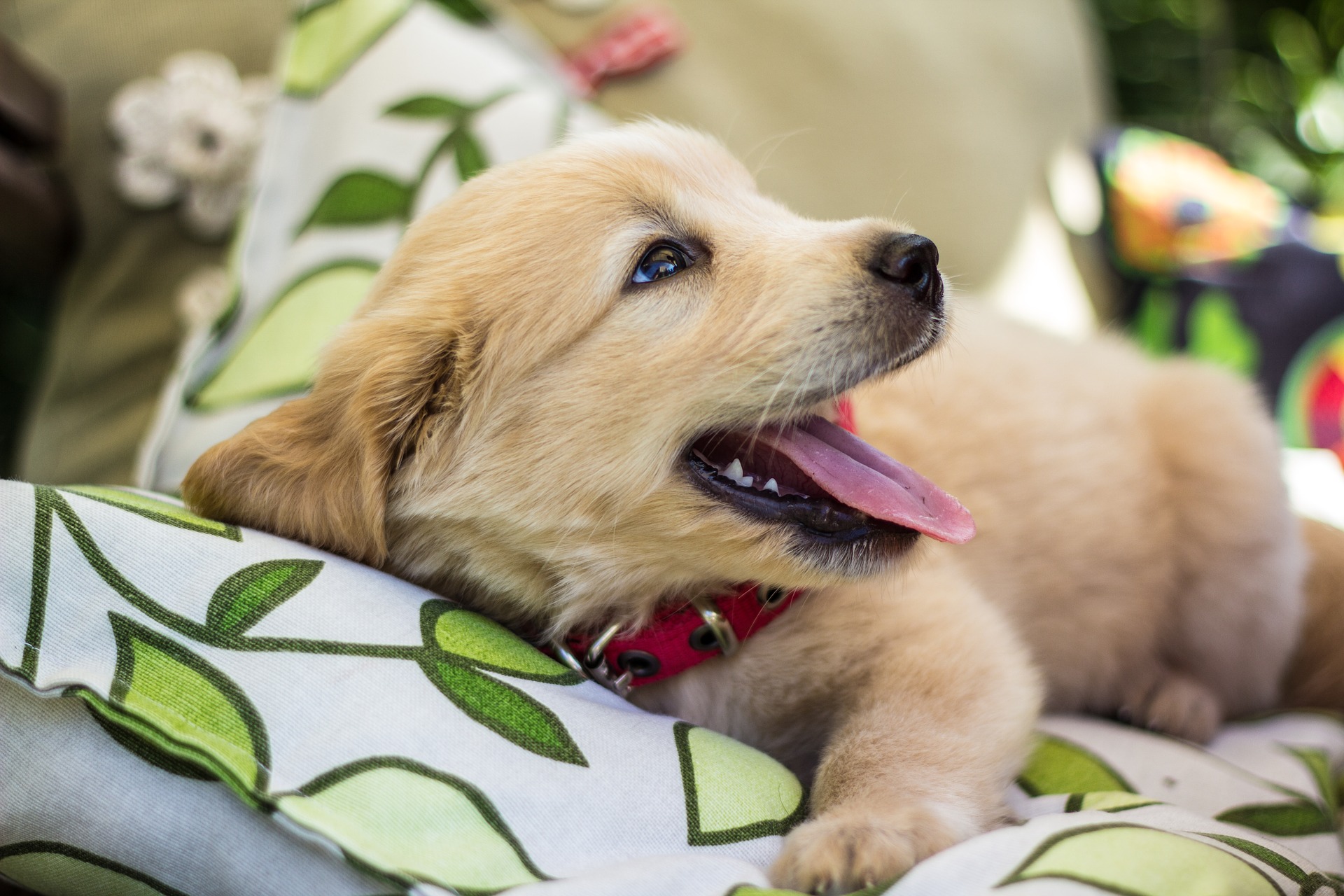

Make Your Dog Calmer and Cleaner
A dog with the urge to mate will not settle down, especially when there is a female dog in the neighborhood.
The dog will sometimes give out discharges that will stain your sofas and carpets and beddings.
Additionally, as the mating dogs roam outside, it is likely to fight other dogs and sustain marks and sores.
A neutered dog will be clean and more comfortable to get along with.
It Doesn’t Increase Weight
After the neutering process, the dog may remain inactive for about three weeks as part of the healing process. This will not increase the weight of the dog, as many people think.
However, you should pay attention to diet and exercise as your dog ages. This is because when dogs become old, they will tend to eat more and do fewer exercises.
Dogs Population Control
When there are dogs with both sexes in the same household, it becomes challenging to control their mating and reproduction.
Neutering will be the easy way here to control your dog’s reproduction.
Cons of Neutering your Dog
While there are many benefits of dog neutering, it still comes with a few cons.
Here are some of them:
It Can Change Your Dog’s Coat Texture
Neutering initiates hormonal changes in dogs. Therefore, it can cause change to the physical characteristics of your dog.
These characteristics include the dog’s coat growth patterns. Neutered dogs’ coats may be sensitive to cold and hot temperatures.
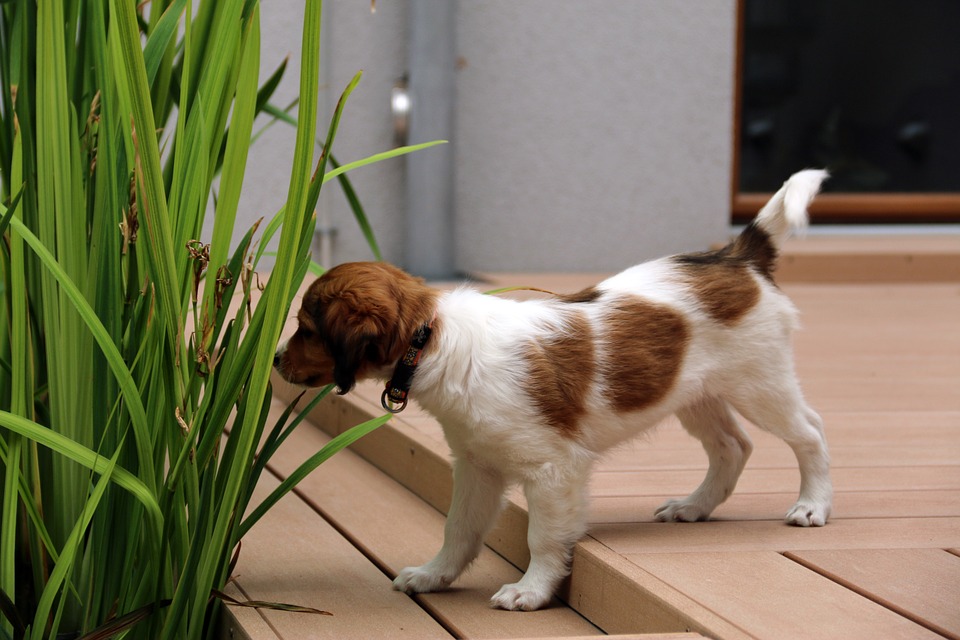

It Can Lead to Urinary Inconsistency
Although this is not very common, it happens to some neutered dogs. It happens when you neuter your dog while it is still young and their bladder is not yet fully developed.
As your dog ages, the bladder muscle will be getting weaker and thus causing urine leakage.
To avoid this, ensure you neuter your dog after they are older than six months.
Affects Your Dog’s Maturation Process
Neutering dogs, while they are still young, will affect their maturation in later days.
While many dogs may benefit from neutering, some dogs will have adverse effects.
Make sure you discuss with your veterinarian before going forward to neuter your dog.
Terminates the Breeding Process
You may neuter your dog while it is young and learn later that it was the right breed. However, you will not be able to reproduce younger ones from it.
The neutering process is permanent and cannot be reversed. The breeding process is taken away from your dog completely.
Neutering Doesn’t Guarantee Complete Behavior Change
Neutering may not be a guarantee for behavior change to dogs that are used to behaviors beyond basic hormones. For instance, your dog will not totally stop urine marking just because they are neutered.
Wrapping Things Up
Neutering can be very beneficial when dealing with aggressive dogs. Dog specialists recommend that every aggressive dog should be castrated.
However, despite the benefits of dog neutering, some dog owners opt not to castrate their dogs.
WATCH VIDEO: Discover How To Finally Solve Your Dogs Unwanted Aggression Problem In Just Minutes A Day… Without The Need For Expensive, Unnecessary Surgery!
(video will open in a new window)
FAQ: Frequently Asked Questions – Will Neutering A Dog Stop Aggression Or Does Neutering A Dog Make It Less Aggressive?
Question #1…
How much does it typically cost to neuter a male dog?
Answer…
Honestly, there are a lot of variables to consider here, such as where you live and the age/breed of your dog.
But to give you a ballpark figure, you can expect to pay anywhere from $75-$300+
You also need to be aware that any type of pre-existing conditions in your dog will likely drive the price even higher. As extra precautions and pre exams will need to be completed to ensure your dog’s safety.
Question #2…
You mentioned previously that there is no guarantee that neutering will stop aggression. How do I know if neutering is the right thing to do?
Answer…
Again, the only thing guaranteed by the neutering process is that it will stop your dog from being able to reproduce.
Neutering can help with the aggressive tendencies in your dog if their aggression is hormone-related. But results can differ depending on the nature of your dog.
At the end of the day, neutering is a permanent, irreversible process. And there have been occasions where owners have reported their dog becoming more aggressive after the neutering process.
This isn’t to say that this will happen to your dog, as these cases are rare. But you do need to be aware of the potential pitfalls before making a final decision.
Question #3…
You mentioned a few times about The Online Dog Trainer Program to get my dog’s aggression under control. How effective is this program, and will it work long-term?
Answer…
Like with most things in life, you get out what you put it. And while Dan’s step-by-step training can work wonders for managing aggression, don’t expect any overnight miracles.
You wouldn’t expect a human to be able to instantly change their behavioral habits, and you shouldn’t expect it from your dog either.
These exercises are simply a tool to take you from point A to point B.
At the end of the day, it’s what you do with them that matters.
Question #4…
Can neutering a dog cause aggression? I’d hate to think I’d be making matters worse instead of better for my dog.
Answer…
The short answer is, yes, it can.
Again, the neutering process can have the desired effect on hormonally related aggression. But the lack of testosterone it leaves can bring about other behavioral issues like fear and anxiety.
This might not seem like a big issue at first, but a dog that lives in a constant state of fear can be just as prone to aggression as an intact dog.
The only difference now is the type of aggression you’re dealing with.
